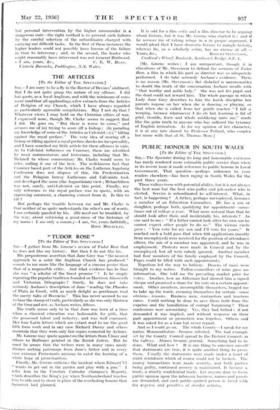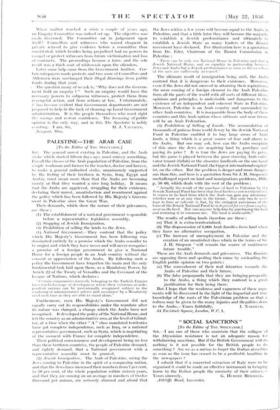PUBLIC HONOUR IN SOUTH WALES
[To the Editor of Tar: SPECTATOR.] SIR,—The Spectator during its long and honourable existence has rarely rendered more estimable public service than when in its recent issue it made reference to public honour in Local Government. That question—perhaps unknown to your readers elsewhere—has been raging in South Wales for the past three years.
These valleys teem with potential ability, but it is not always the best man but the best wire-puller and job-seeker who is elected. Service is subordinated to self-interest. What, in fact, is happening ? A father, perhaps unemployed, becomes a member of an Education Committee. Ile has a son or daughter, perhaps both, qualifying for appointment--some- times out of college a year. What more natural than that he should look after their, and incidentally his, interests ? As one said to me : " If a father cannot look after his own son he cannot expect other people to do so." The vicious circle grew : " You vote for my son and I'll vote for yours." It reached such a bold pass that when 820 applications (mostly from unemployed) were received for the position of attendance officer, the son of a member was appointed, and he was in employment. Protests were made in Council and by the unemployed, but all were calmly ignored. Another member had four members of his family employed by the Council. Pages could be filled with such appointments.
Nepotism led the way to bribery. Dozens of cases were brought to my notice. Fellow-councillors of mine gave me information. One told me the prevailing market price for votes. Another, how an Alderman had showed him a signed cheque and promised a share for his vote on a certain appoint- ment. Other members, incorruptible themselves, begged me to take up the torch, excusing themselves for certain—some obvious—reasons. Business men, contractors and teachers came. Could nothing be done to save them both from the expense and the humiliation of corrupt bargaining ? Their confessions were astonishing. Yes, they had brilxxl : if not demanded it was implied, and without response on their part appointment or promotion was hopeless. Others said it was asked for as a loan but never repaid.
And so I could go on. The whole County—I speak for my native Monmouthshire—became infected. The bad example set by the County Council spread to the District Councils in the valleys. Abuses became general. Something had to be done. What and how ? It is one thing to convince oneself' that statements are true, it is quite another thing to prove them. Usually the statements were made under a bond of strict confidence which of course could not be broken. The money transactions were made secretly, and both parties being guilty, continued secrecy is maintained. It became a trade, a strictly confidential trade. Let anyone dare to focus public opinion upon the infamous business, names and proofs are demanded, and such public-spirited person is faced with the expense and penalties of slander actions.
Wla n matter reached a crisis a couple of years ago, an Enquiry Committee was indeed set up. The objective was easily discerned. The Committee sat in judgement upon itself ! Councillors and witnesses who waxed eloquent in private refused to give evidence before a committee thus eons( aided, which besides being prejudiced had no powers to t 'impel or protect witnesses from future victimisation and loss of contracts. The proceedings became a farce, and the sole result was a thick coat of whitewash upon the offenders.
Later some help came from the Government Auditor. Cer- tain ratepayers made protests and two score of Councillors and Aldermen were surcharged their illegal drawings from public funds during that year.
• The question many of us ask is, "Why does not the Govern- ment hold an enquiry ? " Such an enquiry would have the necessary powers to subpoena witnesses, protect them from revengeful action, and from actions at law. Unfortunately, it has become evident that Government departments are not prepared to help in the task of cleaning up Local Government administration. It is the people themselves who must right the wrongs and restore confidence. The focussing of public (pinion is the only way, and in this The Spectator is nobly



















































 Previous page
Previous page